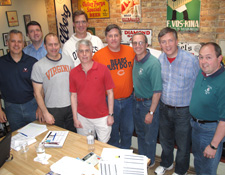 |
’87 Fantasy Baseball: Another Winning Season Rolls Around
By Rebecca Barns
It was spring, 27 years ago, when Joe Prochaska gathered a group of fellow law students in a classroom for their first season of rotisserie (aka fantasy) baseball. That first season was so engaging that he and eight other team owners from Law School are still in the game, including Greg Cross (Smokin’ Buses), Mike Dean and George Schwab (Gungan Crue), De O’Roark (Lounge Lizards), Paul Parmele and Tom Schorr (Schorr Things), Greg Ross (Dancing Bears), and John Tawa (Tawa O’Powa, 2011 champion). Not to be outdone, the founder’s team is dubbed Prochaska’s Possums.
With a few other friends and colleagues, they form the Henry Mathewson Memorial Rotisserie Baseball League, named for a player whose statistics and persona were overshadowed by those of his famous brother, Christy. Since Law School the annual draft has expanded to a three-day event in April, usually occurring soon after the opening of the major league season. One day is set aside for the draft, and wives, children, and girlfriends are invited to all other events. The owners have rotated the annual draft-hosting duties in their hometowns and have been to each at least once, including Austin, Atlanta, Cincinnati, Portland, Ore., Los Angeles, Nashville, Charlotte, D.C., Baltimore, Princeton, and New York City. They’ve also ventured to New Orleans, Seattle, and Louisville. They’ve seen a no-hitter at Dodger Stadium, toured the Louisville Slugger bat factory, and watched thousands of bats (of the mammalian variety) fly out from under a bridge at dusk in Austin.
Despite their demanding schedules, owners are expected to show up on draft day. The dynamics of the fiercely competitive event could never be fully conveyed by a Webcam. After sifting through stats and countless other variables to come up with a list of players for their dream team, they bid for them in $1 increments. Owners have a total of $260 with which they must acquire 23 American League players, including 9 pitchers, 14 hitters, and so on.
More often than not the draft is held in a law firm conference room, but once in a while they break the pattern in great style—as in the memorable 1992 draft that took place in the Tennessee State Senate Chamber, thanks to Prochaska. The event begins with the owners singing the national anthem, and they’ve had some notable accompanists: an Elvis impersonator in Las Vegas, a Kenny G-style saxophone played by a Venable lawyer in Baltimore, an authentic Churchill Downs bugler performing Stars and Stripes and a “call to the rail” in Louisville.
Then they get down to business. In the heat of an auction things can get pretty tense: an owner’s funds run low in the thick of bidding and the pitcher with the overpowering fastball is out of reach, or someone’s stuck with too much money and no decent players to bid on. At this point, things can get loud, but mostly it’s a good-natured battle of wit and witticisms.
As they follow their teams throughout the 162-game season, there are the inevitable ups and downs. “One week a hitter’s performing better than hoped, the next he’s in a slump,” notes O’Roark. “Or a player comes out of nowhere to have the season of his life.” How do they handle these unpredictable swings? “I like to keep a ball-peen hammer in my desk drawer,” quips Dean, also known as the Commish. It’s his job to keep things moving and apply the rules when things get out of hand.
There are plenty of rules in the league’s constitution, drawn up in 1985 and amended as deemed necessary in the years since. Perhaps not surprisingly, the rules are often challenged. “Lawyers are always playing around the edges,” says Dean. “We’re good at it. It’s what we do for a living.”
This year everyone met in Chicago, the city of Big Shoulders, deep-dish pizza, and the start of one team’s championship year.




